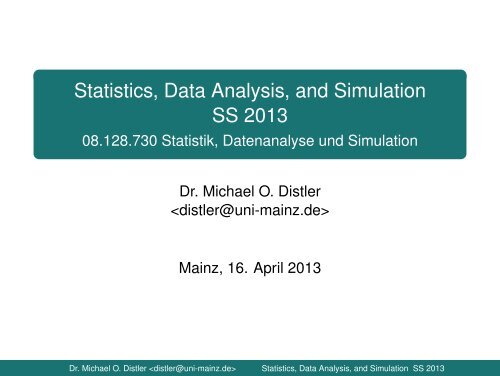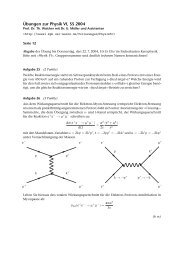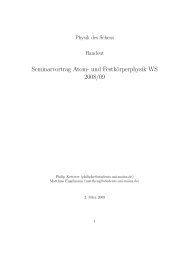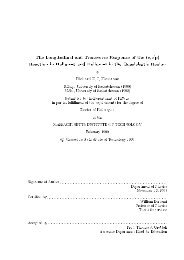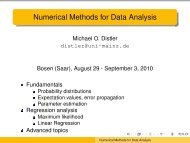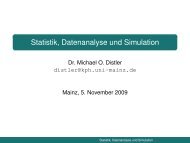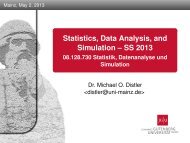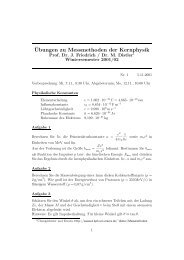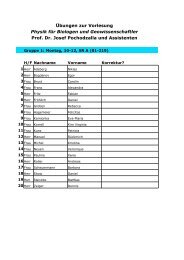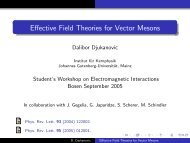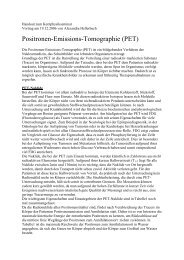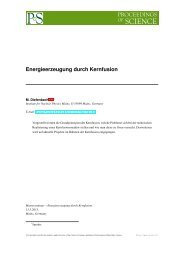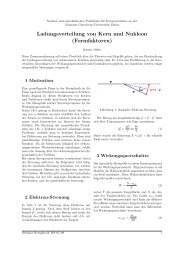Statistics, Data Analysis, and Simulation SS 2013
Statistics, Data Analysis, and Simulation SS 2013
Statistics, Data Analysis, and Simulation SS 2013
Create successful ePaper yourself
Turn your PDF publications into a flip-book with our unique Google optimized e-Paper software.
<strong>Statistics</strong>, <strong>Data</strong> <strong>Analysis</strong>, <strong>and</strong> <strong>Simulation</strong><br />
<strong>SS</strong> <strong>2013</strong><br />
08.128.730 Statistik, Datenanalyse und <strong>Simulation</strong><br />
Dr. Michael O. Distler<br />
<br />
Mainz, 16. April <strong>2013</strong><br />
Dr. Michael O. Distler <strong>Statistics</strong>, <strong>Data</strong> <strong>Analysis</strong>, <strong>and</strong> <strong>Simulation</strong> <strong>SS</strong> <strong>2013</strong>
The Mainz Microtron<br />
1.6 GeV cw electron beam<br />
100 µA unpolarised beam<br />
30 µA beam @ 80 % polarization<br />
Energy stability δE/E = 10 −6<br />
> 5500 h/yr available for experiments<br />
Dr. Michael O. Distler <strong>Statistics</strong>, <strong>Data</strong> <strong>Analysis</strong>, <strong>and</strong> <strong>Simulation</strong> <strong>SS</strong> <strong>2013</strong>
The 3 spectrometer facility<br />
Dr. Michael O. Distler <strong>Statistics</strong>, <strong>Data</strong> <strong>Analysis</strong>, <strong>and</strong> <strong>Simulation</strong> <strong>SS</strong> <strong>2013</strong>
Learning goals <strong>and</strong> objectives<br />
Students will gain a basic knowledge of<br />
statistics, simulation techniques, <strong>and</strong> numerical methods<br />
(algorithms)<br />
Problem:<br />
determine meaningful <strong>and</strong> significant information from<br />
experimental (empirical) data<br />
efficient (economic) data analysis<br />
Application of this knowledge in the data analysis<br />
Probability of events<br />
Uncertainty of a measured quantity<br />
Significance of a measurement (discovery)<br />
Decision rules for (testing of) model hypotheses<br />
Determine (estimate) the best values of parameters<br />
<strong>Simulation</strong> of complex processes<br />
Unfolding, factor analysis, pattern recognition, . . .<br />
Dr. Michael O. Distler <strong>Statistics</strong>, <strong>Data</strong> <strong>Analysis</strong>, <strong>and</strong> <strong>Simulation</strong> <strong>SS</strong> <strong>2013</strong>
Contents<br />
Introductory Remarks<br />
Statistic:<br />
probability, distributions, discrete distributions, special<br />
continuous distributions, theorems, sampling, multidimensional<br />
distributions<br />
Monte Carlo methods:<br />
r<strong>and</strong>om number generators, Monte Carlo integration<br />
Parameter estimation:<br />
the method of maximum likelihood, variance of the estimators<br />
The method of least squares:<br />
linear least squares, properties, generalized least squares<br />
Hypothesis testing<br />
Advanced topics:<br />
unfolding, factor analysis, pattern recognition, . . .<br />
Dr. Michael O. Distler <strong>Statistics</strong>, <strong>Data</strong> <strong>Analysis</strong>, <strong>and</strong> <strong>Simulation</strong> <strong>SS</strong> <strong>2013</strong>
Literature<br />
V. Blobel, E. Lohrmann: Statistische und numerische<br />
Methoden der Datenanalyse, Teubner Verlag (1998),<br />
available as http://www.desy.de/∼blobel/eBuch.pdf<br />
S. Br<strong>and</strong>t: Datenanalyse, BI Wissenschaftsverlag (1999)<br />
Philip R. Bevington: <strong>Data</strong> Reduction <strong>and</strong> Error <strong>Analysis</strong> for<br />
the Physical Sciences, McGraw-Hill (1969)<br />
R.J. Barlow: <strong>Statistics</strong>, John Wiley & Sons (1993)<br />
G. Cowan: Statistical <strong>Data</strong> <strong>Analysis</strong>, Oxford University<br />
Press (1998)<br />
W.T. Eadie et al.: Statistical Methods in Experimental<br />
Physics, North Holl<strong>and</strong> Publishing Company<br />
Dr. Michael O. Distler <strong>Statistics</strong>, <strong>Data</strong> <strong>Analysis</strong>, <strong>and</strong> <strong>Simulation</strong> <strong>SS</strong> <strong>2013</strong>
Administration<br />
Home page: http://wwwa1.kph.uni-mainz.de/<br />
Vorlesungen/<strong>SS</strong>13/Statistik/<br />
Lecture time: Tuesday, 12:15-13:00,<br />
Thursday, 8:30 - 10:00.<br />
<strong>and</strong> place: seminar room 1, Institut für Kernphysik<br />
Problem solving time: Tuesday, 13:15 - 14:00<br />
<strong>and</strong> place:<br />
seminar room 1, Institut für Kernphysik<br />
“Studienleistung”:<br />
regular <strong>and</strong> active participation in the practical exercises,<br />
solve at least 10 problem sets (out of 12),<br />
achieve > 50% total score.<br />
“Prüfungsleistung”:<br />
oral examination (30 min) e.g. “Vertiefungsvorlesung<br />
(Master)”, “benoteter Schein”<br />
none e.g. “Spezialvorlesung (Master)”, “unbenoteter Schein<br />
(Diplom)”<br />
Dr. Michael O. Distler <strong>Statistics</strong>, <strong>Data</strong> <strong>Analysis</strong>, <strong>and</strong> <strong>Simulation</strong> <strong>SS</strong> <strong>2013</strong>
Problem solving classes<br />
“classical” problem sets (comprehension <strong>and</strong> calculation)<br />
“computer based” problems (put the theory into practice)<br />
problems will be h<strong>and</strong>ed out after the Thursday lecture<br />
(<strong>and</strong> will be available online)<br />
due date is the following Thursday, 10am.<br />
Dr. Sören Schlimme will grade the answers <strong>and</strong> discuss<br />
the solutions during the problem solving classes.<br />
Dr. Michael O. Distler <strong>Statistics</strong>, <strong>Data</strong> <strong>Analysis</strong>, <strong>and</strong> <strong>Simulation</strong> <strong>SS</strong> <strong>2013</strong>
Examples<br />
Dr. Michael O. Distler <strong>Statistics</strong>, <strong>Data</strong> <strong>Analysis</strong>, <strong>and</strong> <strong>Simulation</strong> <strong>SS</strong> <strong>2013</strong>
Examples<br />
Dr. Michael O. Distler <strong>Statistics</strong>, <strong>Data</strong> <strong>Analysis</strong>, <strong>and</strong> <strong>Simulation</strong> <strong>SS</strong> <strong>2013</strong>
Examples<br />
Dr. Michael O. Distler <strong>Statistics</strong>, <strong>Data</strong> <strong>Analysis</strong>, <strong>and</strong> <strong>Simulation</strong> <strong>SS</strong> <strong>2013</strong>
Introductory Remarks<br />
<strong>Data</strong> analysis is used in many scientific fields,<br />
but the lecture here is aimed at mainly physicists.<br />
Therefore, a preliminary remark from this view:<br />
Physics is the science of quantifiable observations.<br />
The comparison:<br />
observations ←→ classification scheme<br />
takes place quantitatively, ie it comes to numbers.<br />
Dr. Michael O. Distler <strong>Statistics</strong>, <strong>Data</strong> <strong>Analysis</strong>, <strong>and</strong> <strong>Simulation</strong> <strong>SS</strong> <strong>2013</strong>
Introductory Remarks<br />
<strong>Data</strong> analysis in nuclear <strong>and</strong> particle physics<br />
Observe events of a certain type<br />
Measure characteristics of each event<br />
Theories predict distributions of these properties up to free<br />
parameters<br />
Some tasks of data analysis:<br />
Estimate (measure) the parameters;<br />
Quantify the uncertainty of the parameter estimates;<br />
Test the extent to which the predictions of a theory are in<br />
agreement with the data.<br />
Dr. Michael O. Distler <strong>Statistics</strong>, <strong>Data</strong> <strong>Analysis</strong>, <strong>and</strong> <strong>Simulation</strong> <strong>SS</strong> <strong>2013</strong>
Introductory Remarks<br />
Theory: numbers are calculated using a model.<br />
Experiment: numbers are derived from observation.<br />
This raises the issue of consistency<br />
between theory <strong>and</strong> experiment.<br />
What does consistency or agreement mean?<br />
Is there a measure of (non-) agreement?<br />
Dr. Michael O. Distler <strong>Statistics</strong>, <strong>Data</strong> <strong>Analysis</strong>, <strong>and</strong> <strong>Simulation</strong> <strong>SS</strong> <strong>2013</strong>
Introductory Remarks<br />
Philosophy of Science<br />
Karl R. Popper (* 28. Juli 1902 in Vienna, Austria;<br />
† 17. September 1994 in London, Engl<strong>and</strong>) coined the term<br />
critical rationalism. At the heart of his philosophy of science lies<br />
the account of the logical asymmetry between verification <strong>and</strong><br />
falsifiability. Logik der Forschung, 1934.<br />
−→ Existence of a true value<br />
of measured quantities <strong>and</strong> derived values.<br />
Dr. Michael O. Distler <strong>Statistics</strong>, <strong>Data</strong> <strong>Analysis</strong>, <strong>and</strong> <strong>Simulation</strong> <strong>SS</strong> <strong>2013</strong>
Recipe: How to do science?<br />
observation<br />
(of nature)<br />
hypothesis<br />
(model)<br />
deduction<br />
experiment<br />
(reproducible)<br />
prediction<br />
(falsifiable)<br />
? Truth ?<br />
Important philosophical questions:<br />
How to gain knowledge?<br />
What is truth?<br />
What is a scientific theory?<br />
Dr. Michael O. Distler <strong>Statistics</strong>, <strong>Data</strong> <strong>Analysis</strong>, <strong>and</strong> <strong>Simulation</strong> <strong>SS</strong> <strong>2013</strong>


